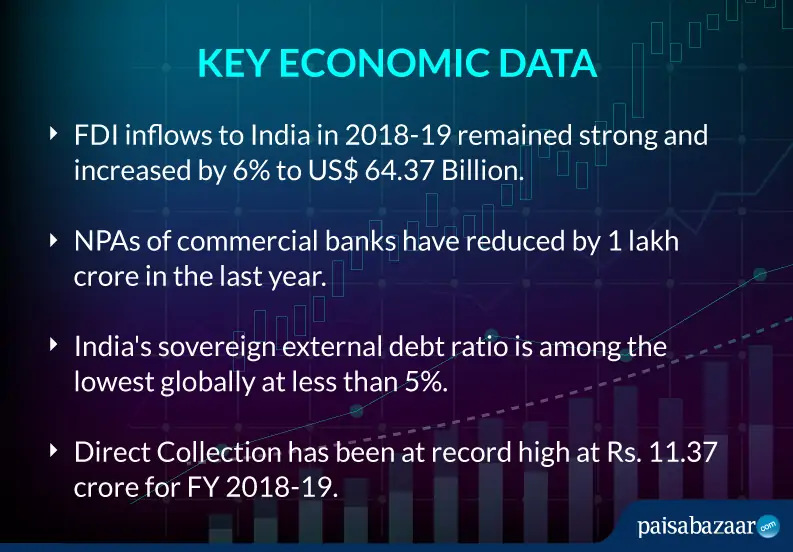The Union Budget 2019-20 was presented in the parliament today by the newly appointed finance minister, Nirmala Sitharaman. The government aims to grow the economy to US$5 trillion by the 2024-25 financial year. The minister said that India will become a US$3 trillion economy in the current year.

While there were several announcements made affecting different strata of society, here are some of the key highlights from the investment perspective in the 2019-20 budget:
- Pradhan Mantri Karma Yogi Man-Dhaan Scheme: Government to extend pension benefits to retail traders and small shopkeepers whose turnover less than Rs. 1.5 crore under the new scheme. The beneficiaries need to only present their Aadhaar card and bank account details to subscribe to the pension scheme.
- National Pension System (NPS) gets EEE status in terms of tax treatment. This means the NPS corpus withdrawn at the time of retirement will be entirely tax-free. Further, contributions made to NPS Tier II accounts can also be claimed for tax deduction under section 80C.
- For safeguarding wider interests of NPS subscribers, NPS Trust is to be separated from Pension Fund Regulatory Authority of India (PFRDA).
- Government to offer investment options in Exchange Traded Funds (ETFs) on the line of Equity Linked Saving Scheme (ELSS). This means tax benefits would be offered on investment in ETFs to encourage long-term investments in Central Public Sector Enterprises.
- An action plan to be developed for deepening of long-term bonds market including corporate bond market and credit default swap to revive investment activity in the economy.
- Tax relief on the levy of Security Transaction Tax (STT) as it has been restricted to the difference between settlement and strike price in the exercise of options. Earlier it was charged on the total transaction value at 0.125%.
- Foreign Institutional Investors (FIIs) investing in debt securities of Infrastructure Debt Fund issued by NBFCs are allowed to sell such investments to domestic investors but within the specified lock-in period.
- Government to increase its minimum public shareholding in listed companies from the current 25% to 35%.
- SEBI to take steps to enable listing of Social Stock Exchange in order to list social enterprises and voluntary organization to raise market capital.
- 100% FDI permitted to Insurance Intermediaries.
- NRI-Portfolio investment route has been merged with foreign portfolio investors to facilitate NRI investment in Indian capital markets.
- Capital infusion to the tune of Rs. 70,000 crore in the public-sector banks.
- Government has set an enhanced target of Rs. 1.05 lakh crore of disinvestment in FY 2019-20.
Also Read: Union Budget 2019: Impact on Common Man